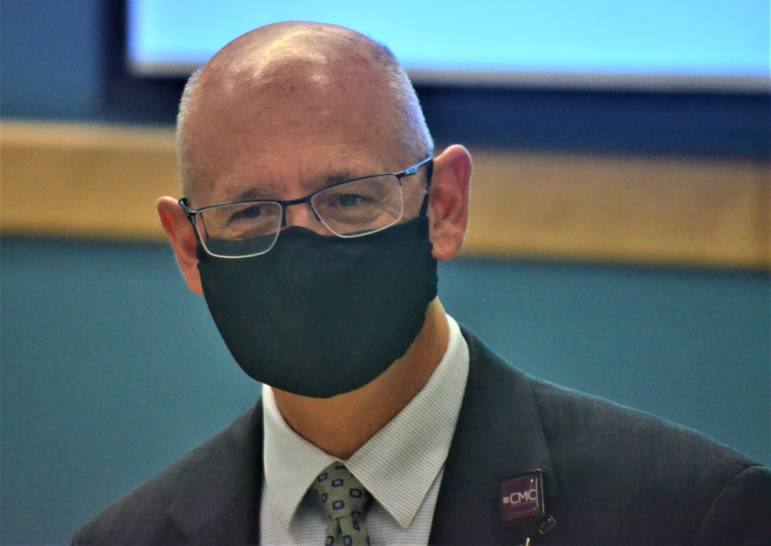
MANCHESTER, N.H. – The COVID-19 pandemic has impacted every single part of American society, particularly hospitals. And in New Hampshire one hospital has borne a significant amount of the state’s burden in combatting the pandemic.
On Tuesday morning, U.S. Senator Jeanne Shaheen (D-NH) received a briefing at Catholic Medical Center (CMC) providing an overview of the past few months at the hospital as well as thoughts for the future.
According to CMC CEO Dr. Joseph Pepe and CMC COO Alex Walker, the hospital expects to lose approximately $45.5 million after the final valuation of its 2020 Fiscal Year, which ended at the end of September.
That figure accounts for state and federal aid from sources like the CARES Act, with gross losses through August reaching approximately $72 million.
At the peak of the pandemic when certain procedures needed to be postponed, CMC furloughed approximately 1,300 staff members. Ultimately, 71 staff members needed to be laid off, but the hospital is back to about 85 percent of where it was according to Pepe and Walker. However, Pepe added that 85 percent is still a far way from where it needs to be as the hospital has struggled to qualify for additional federal aid.
“One of things this pandemic has demonstrated is that that there are a lot of haves and have nots. People think of hospitals in one big bucket, but here in New Hampshire the margins are very thin,” said Pepe. “Even at 100 percent, we have (profit) margins of one percent. So in able to get to where we need to be, we need to be at least 100 percent of pre-COVID levels.”
In addition to the financial toll, CMC has also played a disproportionate roll in serving the state during the pandemic, treating approximately a third of all COVID cases in the state, combining with Eliot Hospital across town for approximately two-thirds of the state’s COVID cases. The auxiliary treatment center at Southern New Hampshire University also remains as the last auxiliary center in the state, with the southern tier accounting for 77 percent of all COVID cases and 89 percent of all COVID deaths.
CMC has also seen non-COVID patient volume down 21 percent year-over-year from 2019 figures as area residents slowly regain confidence coping with the dangers of the pandemic as the world adjusts to the new COVID reality.
Walker said that near Labor Day, the hospital had finally reached the point where there were no more COVID patients, although a recent spike has seen approximately four to eight per day. However, at the peak of the pandemic in April, he said that CMC would see approximately 30 to 45 COVID cases per day.
Despite the hardships, the hospital has seen a silver lining in its efforts to cope with the pandemic.
In addition to new state-of-the-art temperature checking technology, which was referred to as the gold standard by the Joint Commission, new “street medicine” efforts have begun to help homeless residents who need assistance dealing with the pandemic but may be wary of remaining in a crowded shelter or going to a hospital.
The additional screening protocols for visitors have also revealed a sharp drop in relapses for opioid users treated by the hospital, with security officials discovering that many visitors to opioid patients were smuggling in drugs and other paraphernalia that patients would hide within mattresses, a process that ultimately destroyed eight mattresses costing several thousand dollars each.
Pepe said that both the outreach to the city’s homeless population as well as the modified visitor procedures for opioid patients would continue after the pandemic ends.
Shaheen and the assembled CMC staff thanked each other for their efforts, with Shaheen saying the lack of support for hospitals was one of the main reasons she would not support the new COVID relief proposals of U.S. Senate Majority Leader Mitch McConnell (R-KY), adding the she would not support future relief proposals that did not include support for hospitals or healthcare workers.
“It’s not in anyone’s interest to have hospitals close. It’s not just care for people, it’s also jobs,” she said. “It just seems crazy to me at a time like this that we won’t help you get through this difficult time.”








